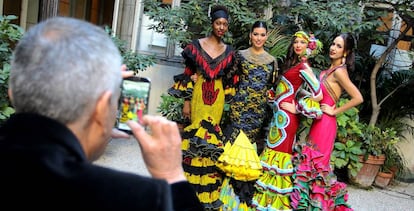Flamenco fashion with a splash of African color
Thirty dresses made from Senegalese fabric auctioned to raise funds for project near Dakar
Thirty of Spain’s leading flamenco couturiers have joined a project led by Spanish NGO Teranga, which is working in Senegal to help train marginalized women and children in the art of fabric craft and design. Each dressmaker has produced a garment using African fabric, the colors of which are traditionally believed to influence the person who wears it. Now the dresses have been sold at an online auction by Durán and the proceeds earmarked to finance Teranga’s scheme.

Teranga was set up a year and a half ago by three friends from Seville – Cristina Ramos, Beatriz Casero and Azucena Mongil. The idea, says Cristina, was to be “useful to others”, an objective that took them to the Senegalese city of Sébikotane, 30km from Dakar, more than 90% of whose population of 21,000 consists of women and boys under the age of 15. There, the three visited a project run by local NGO Gie Feddé Amdy Raby, which, after providing training, sells the crafts and designs produced by the women and children and uses the money to improve their lives.
When we have the money, we will go back to Senegal to work with these women Cristina Ramos, Teranga
“During the trip, we realized that although the NGO was doing a great job, the sale of the products was limited to the immediate surroundings,” says Ramos. “So we thought we could design the products with them and adapt them to the European market. That way, we would create an efficient production line. All we were lacking was the means to finance the idea.”
The three friends used the trip to buy typical Senegalese fabrics with which they made the ruffled dresses known in Spain as faralaes for the annual Seville Fair, held in April. “People were very complimentary about the dresses and the eye-catching colors,” recalls Ramos. “And one friend gave us the idea of using the dresses as a way to finance our project. He suggested contacting Raquel Revuelta to gain visibility.” A former model, Revuelta now promotes the Salón Internacional de la Moda Flamenca (Simof).
Revuelta immediately agreed to back the initiative and dedicated Salón Internacional’s runway benefit to it. More than 30 Spanish designers specializing in flamenco fashion joined the initiative, making dresses with the fabric that the three Teranga friends had brought from Senegal.
“I fell in love with the fabrics from the word go,” explains Amparo Pardal, one of the 30 designers. “I thought it could be complicated but the fabric dictated the design.”
People were very complimentary about the dresses and the eye-catching colors Cristina Ramos, Teranga
Sonia Barco and Isabel Bizcocho, from Seville-based design firm Sonibel, were also glad to have been part of the project. “Apart from the solidarity aspect, the fabrics were beautiful and very adaptable. We loved being able to help.”
After the success of the catwalk show, the Teranga trio decided to exhibit the outfits before selling them so that the work put in by the 30 designers could be fully appreciated. And so the dresses went on show in the Durán jewelers in Seville until the auction was over. “When we have the money, we will go back to Senegal to work with these women,” the three friends explain.
“They are going to be self-sufficient and able to own their home and their future where they want it, in their own country.”
English version by Heather Galloway.
Tu suscripción se está usando en otro dispositivo
¿Quieres añadir otro usuario a tu suscripción?
Si continúas leyendo en este dispositivo, no se podrá leer en el otro.
FlechaTu suscripción se está usando en otro dispositivo y solo puedes acceder a EL PAÍS desde un dispositivo a la vez.
Si quieres compartir tu cuenta, cambia tu suscripción a la modalidad Premium, así podrás añadir otro usuario. Cada uno accederá con su propia cuenta de email, lo que os permitirá personalizar vuestra experiencia en EL PAÍS.
¿Tienes una suscripción de empresa? Accede aquí para contratar más cuentas.
En el caso de no saber quién está usando tu cuenta, te recomendamos cambiar tu contraseña aquí.
Si decides continuar compartiendo tu cuenta, este mensaje se mostrará en tu dispositivo y en el de la otra persona que está usando tu cuenta de forma indefinida, afectando a tu experiencia de lectura. Puedes consultar aquí los términos y condiciones de la suscripción digital.









































